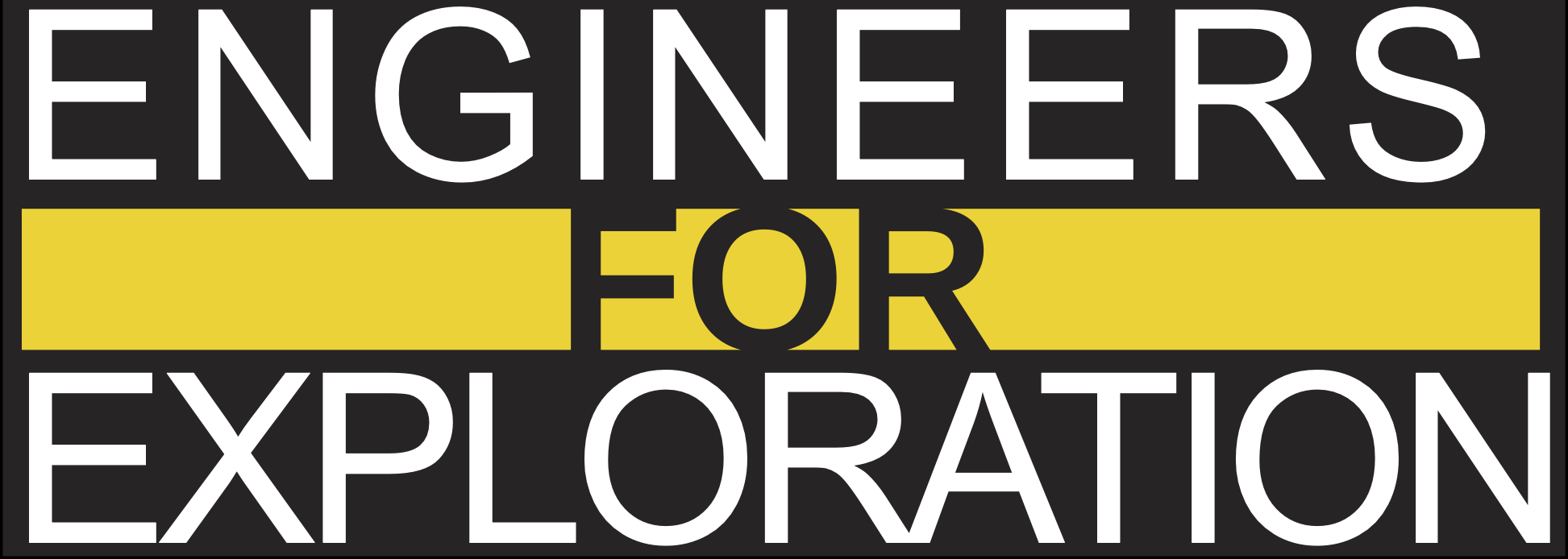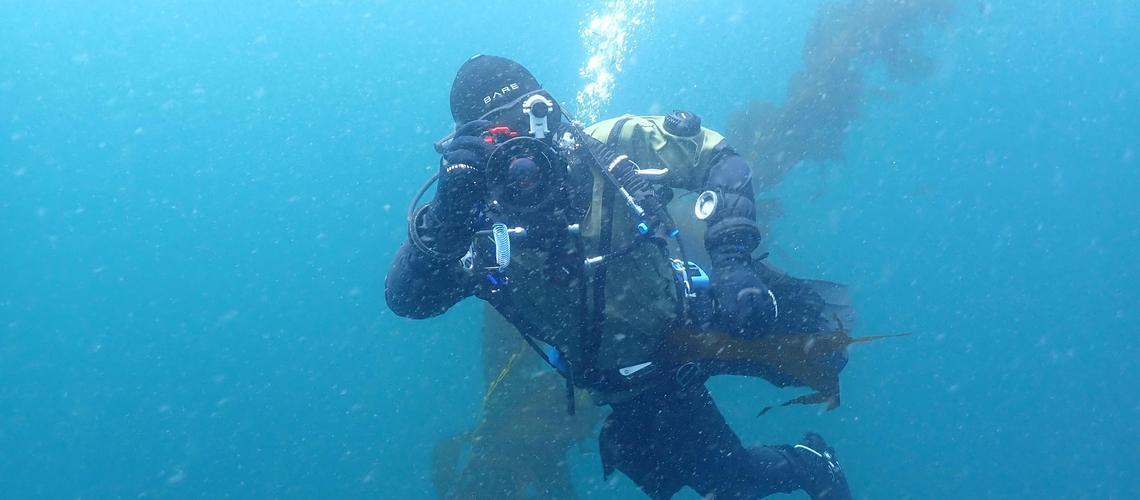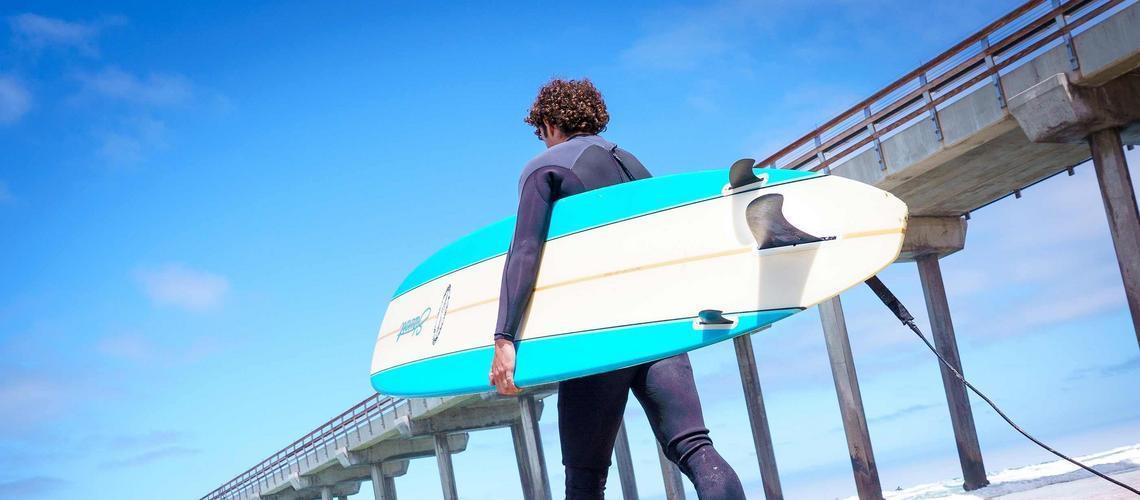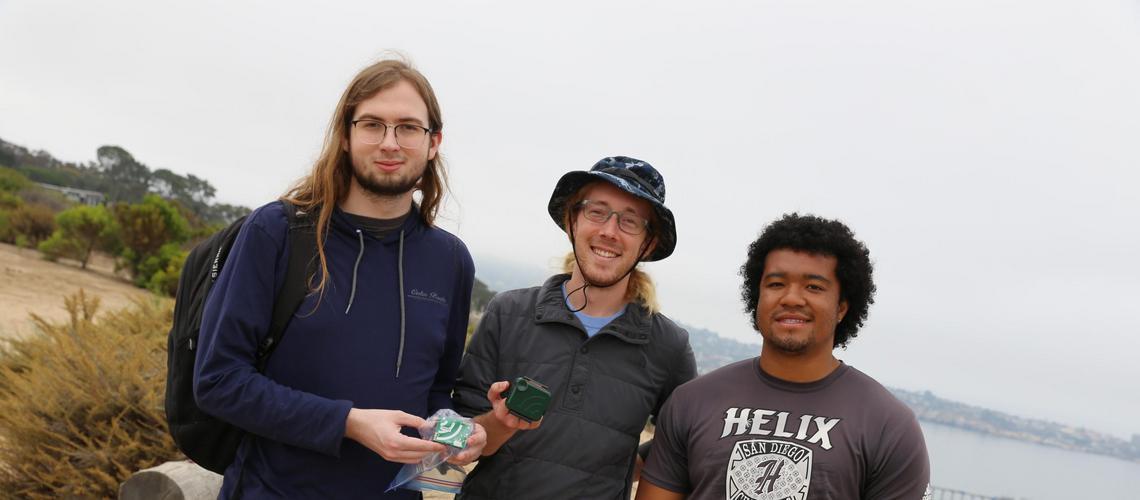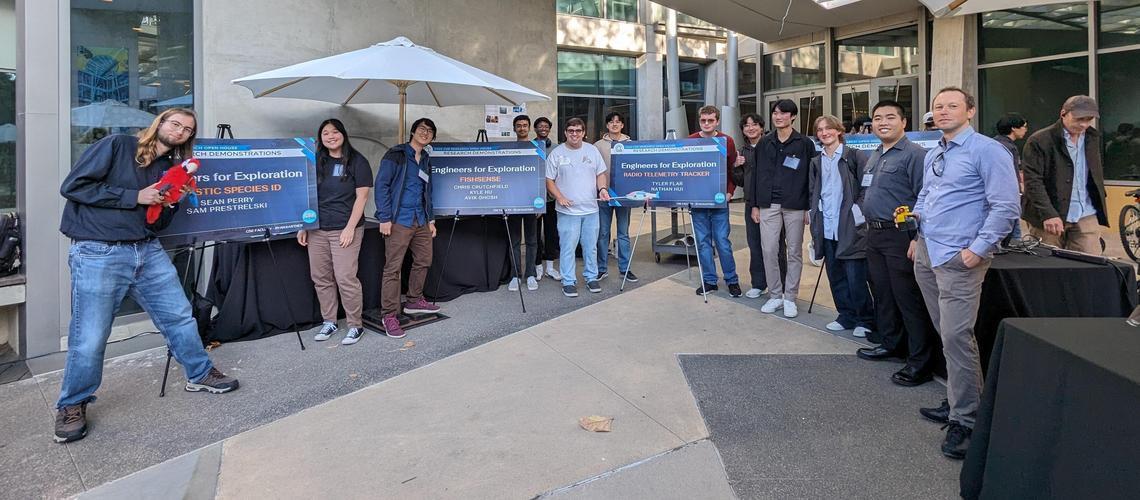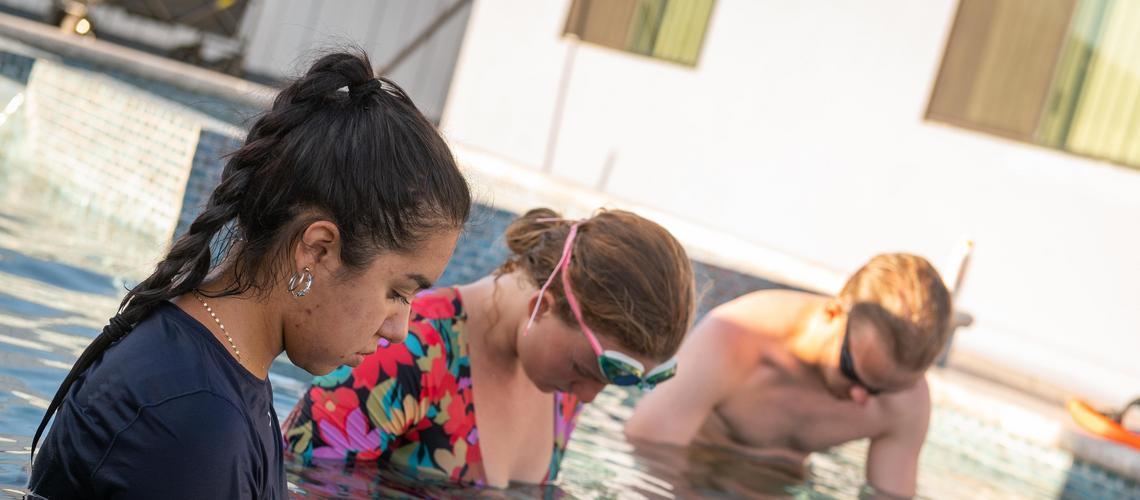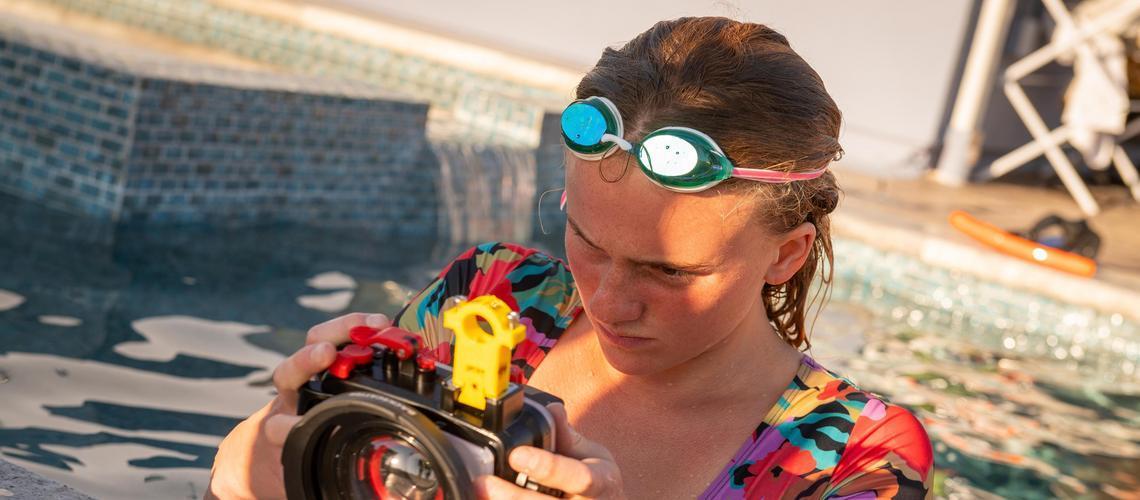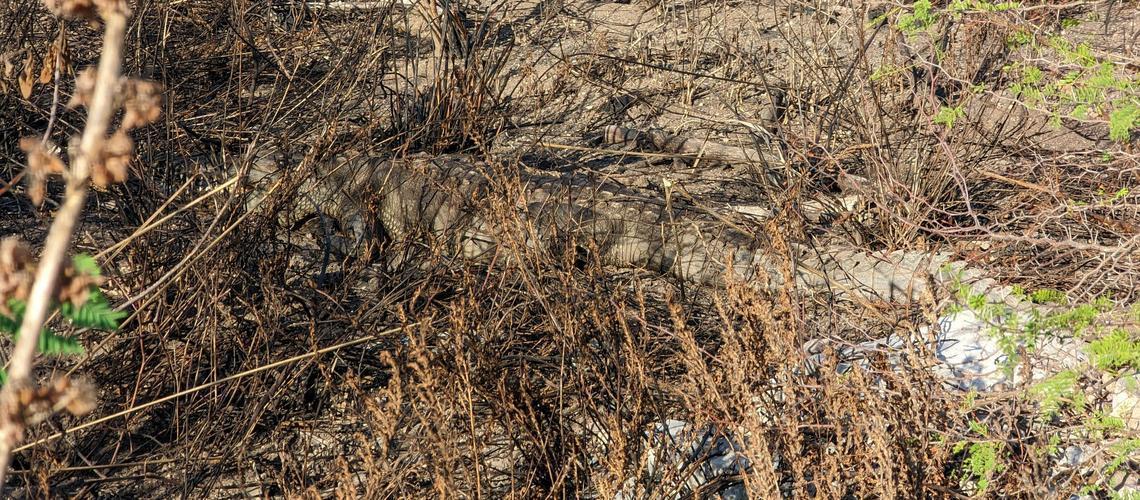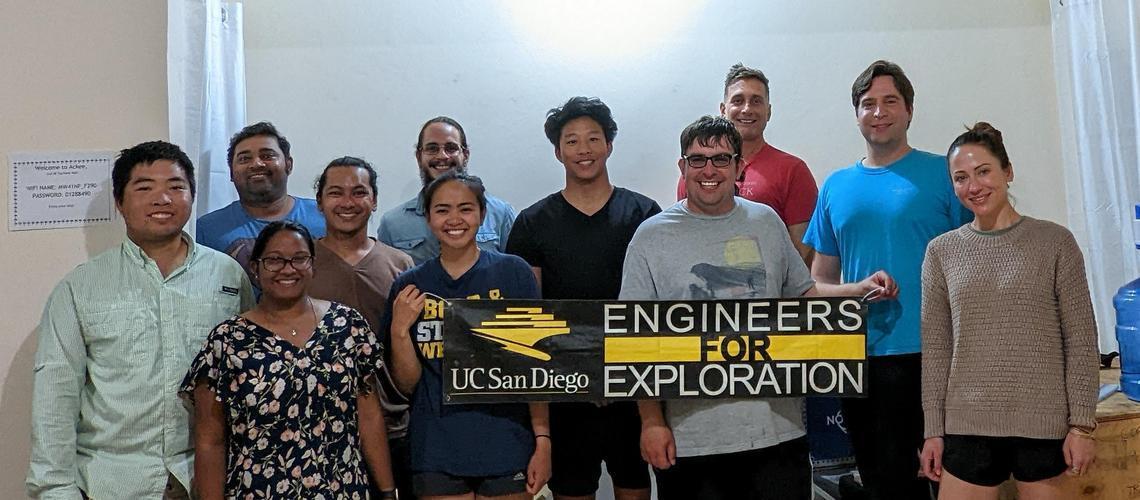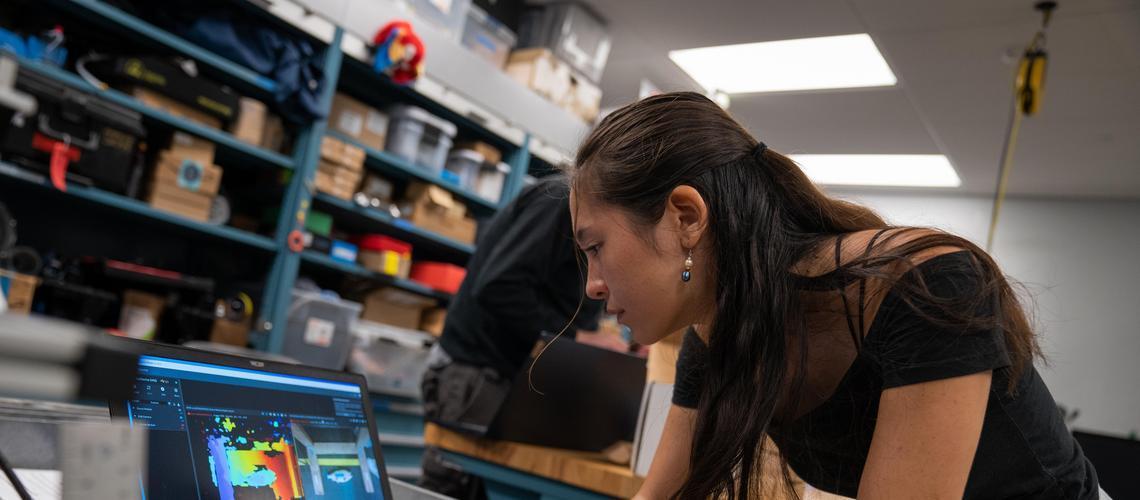EXPLORATION THROUGH TECHNOLOGY
Engineers for Exploration (E4E) is a one of a kind program centered around multidisciplinary and collaborative student research projects with the broad goals of protecting the environment, uncovering mysteries related to cultural heritage, and providing experiential learning experiences for undergraduate and graduate students. We team student engineers with scientists from a wide range of disciplines, such as ecology, oceanography and archaeology. Students create new technologies to aid these scientists in their work and then accompany them on field deployments around the world. Projects train students in embedded systems and software, machine learning, electronic integration, mechanical design, system building, as well as project management and team leadership.
Interested in joining?SPONSOR OUR RESERACH
Your support allows us to involve more students, which allows us to continue our research on existing and future projects. It is easy and even a small amount can make a big impact. Donate To UCSD E4E.
-
Kendall-Frost Marsh Acoustic Deployment!
South of UCSD lies Mission Bay, a popular tourist spot once a biodiverse-rich marshland destroyed through a combination of dredging and the redirection of the San Diego River. However, recent efforts have begun to preserve and restore some of the original habitats, particularly in the Kendall-Frost Marsh, one of several biodiversity reserves managed by the UC Natural Reserve System. This 40-acre marshland lies in the northern section of Mission Bay and is a popular spot for migrating birds and two endangered species: “Ridgway’s rail and Belding’s savannah sparrow” [1,2]. Towards aiding in the preservation of this wetland and protecting our avian friends, the Acoustic Species Identification Team at Engineers for Exploration has started conducting Acoustic deployments to the wetland. Efforts led by 1st-year master’s student Wesley Wu and 1st year PhD and Project Lead Sean Perry have resulted in two audio recording devices monitoring continuously for 3 weeks near Ridgway’s rail nesting sites and closer to the coastline. The goal: The ability to later create new systems for monitoring bird activity around the marsh and the impact of anthropogenic noise on these incredible local species that call the marsh their home. Love Your Wetlands Day: February 1st, 2025 Upon Wesley reaching out and connecting with the folks at UC Natural Reserve System and making plans to start investigating passive acoustic monitoring to protect species at the reserve, Wesley and Sean started by scouting out the Marsh during an open house event as part of Love Your Wetlands Day at the Kendall Frost Marsh. Hundreds of people and organizations were there, out to explore this ecosystem and many people working to protect it. View of Kendall Frost Marsh looking Southeast from Crown Point drive taken by Sean Perry at 11:04 AM during the Love Your Wetlands Day. This image was taken at high tide, so not much of the beach is visible. Thus, the area in particular was quite flooded. There are several artificial mounds designed to act as Nesting Platforms for the Ridgeway’s rail and many other species. For Wesley and Sean, the main focus was less on the event and more on scouting out the area. The team was aiming for a March Deployment, and finding a good location for the audio devices was paramount. Especially since we would not be able to deploy closer to the nesting platforms, as in just a few weeks, the nesting season would start. As to not disturb the birds, researchers are not allowed near the nesting platforms. However, the team was able to scout out a small peninsula that was about 10 meters away from the closet nesting platform across a small river. Notably on this peninsula was a small hill that would overlook the area during high tide and several small grasses and shrubs that held the ground together near one of these platforms. 2 views of Inner Crown Point, the area explored as a possible site for deployment for the audio devices taken by Sean Perry. On the left is a view facing west and on the right from a view facing north from roughly the same location. On the left, you can observe the hill in the distance and the right shows where the various and reasonably dry shrubs are. Notice in the right image, how close this area is to a nearby nesting platform! Upon collecting GPS coordinates of various views of the area, we decided this was a fantastic spot to do the deployment. We could get close to the nesting platforms without disturbing the bird species and potentially still have recordings sit above the water line. With that, we headed back home to start prepping for the deployment. Preperation Two key aspects were needed to get ready to go: Getting approval for the deployment, and getting the equipment set up. Wesley handled the documentation work and networking with the Nature Reserve System to approve the deployment (which was quite a bit of work!). Sean primarily worked on acquiring recording equipment and setup. The devices of interest were the Hydromoth and Audiomoth. Both devices were created by Open Acoustic Devices, with the biggest difference between the two being the Hydromoth was rated for underwater use cases 3. The Audiomoth, being less waterproof, would be placed further away from the waterline than the Hydromoth in the upcoming deployment. Photos of the Hydromoth (left) and Audiomoth (Right) as taken by Wesley Wu. These devices are inexpensive, omnidirectional microphones intended for passive acoustic recording deployments Deployment: March 8th, 2025 The day of the deployment at the Kendall-Frost Marsh with a much lower tide than during scouting. Taken by Wesley Wu With forms signed, devices ready, and permissions granted for the deployment, the team set off early (for a Saturday morning) back to the Kendall Frost Marsh! Upon arrival, we donned high-vis vests, borrowed a couple of wooden stakes, and began trekking down to the marsh. The Hydromoth was placed among the weeds and grasses closer to the tidal zone and the nesting platforms. Even with a night high tide, we were confident as we staked the recording device into the ground that we would get some great audio recordings from it. The Hydromoth, deployed closer to the river and within the tidal zone. The closest nesting platform can be seen on the right edge of the image. Taken by Wesley Wu. Meanwhile, the Audiomoth, which was not rated for underwater use, was placed on a nearby hill. Wesley checking if the Audiomoth is secure and recording. Wesley and Sean took turns getting the Hydromoth and audio prepped while the other person recorded the GPS location and photos documenting the deployment. Taken by Sean Perry The Future These devices will record continuously for 3 weeks with a sample rate of 48 kHz. The team has been working on San Diego Bird Species-based Machine Learning classifiers to identify species local to San Diego in audio data. Once we collect the devices, we will be focused on labeling as much data as possible to identify species of interest. By working to make this process cheaper, ecologists could potentially use audio recordings as another method for studying these species that are slowly recovering as the original habitat continues to improve. Then, not only can people cherish and love their wetlands but also hear and recognize the many birds that call these wetlands their home. Sean (left) and Wesley (right) celebrating their work with one last photo of the marsh. Taken by Sean Perry [1] Natural Reserve System. July 2015. Available at: https://ucnrs.org/reserves/kendall-frost-mission-bay-marsh-reserve/ [http] [2] Ucsd.edu. 2025. Available at: https://nrs.ucsd.edu/reserves/kendall-frost/index.html [http] [3] openacousticdevices. 2025. Available at: https://www.openacousticdevices.info/audiomoth [http]
-
Winter 2025 Info Session
Info session will be held at CSE 1242 on January 14th at 2:00 PM! Engineers for Exploration is a one of a kind program that develops intelligent systems that aid research in conservation, cultural heritage, and exploration. We work closely with archaeologists, biologists, ecologists, and marine scientists to create technologies that aid them in their scientific research. Applications range from determining population counts for endangered animals and studying animal behavior to capturing large-scale ecological data and visualizing archaeological discoveries. Engineers for Exploration centers around student-led teams who tackle the design process from beginning to end, from planning and prototyping various designs, culminating in deploying the system in the field alongside scientists and explorers. This is a unique opportunity to work on a project with real-world impact for our collaborators. This quarter, we are looking for students to join seven different projects, working on topics such as radio tracking pandas and lizards, detecting bird species using machine learning and sound, monitoring sea surface temperature with surfers, and much more! If you are interested, please fill out the application online at https://e4e.ucsd.edu/join. Applications for this quarter should be submitted by January 26th.
-
Acoustic Species ID goes to NeurIPS 2024!
Our work, “A Deep Learning Approach to the Automated Segmentation of Bird Vocalizations from Weakly Labeled Crowd-sourced Audio” was accepted and presented at NeurIPS 2024 in the “Tackling Climate Change with Machine Learning” Workshop hosted by Climate Change AI! Congrats to the authors: Jacob Ayers, Sean Perry, Samantha Prestrelski, Tianqi Zhang, Ludwig von Schoenfeldt, Mugen Blue, Gabriel Steinberg, Mathias Tobler, Ian Ingram, Curt Schurgers and Ryan Kastner. View of Canada Place, an iconic landmark of Vancouver. View taken from the east side of the Vancouver Convention Center. The conference actually took place in both buildings with an underground tunnel connecting the two, as seen on the bottom right of the image. Taken by Sean Perry This focused on the issue of weakly labeled datasets, often associated with large, bioacoustic crowdsourced datasets. Traditional methods frequently use approaches rooted in digital signal processing approaches to identify the species of interest. The paper takes a look at testing these methods with deep learning models. It can be found here. Credits to Mathias Tobler for first conceptualizing the idea. Key contributions to this work include PyHa, the Python repository where the main technologies used in the paper are stored. Credits primarily to Jacob Ayers for creating the repo and for his vision of the project and Samantha Prestrelski for developing it and carrying out experiments. Further thanks to Gabriel Steinberg for his technical contributions with isolation techniques and chunking methods and Mugen Blue for his training of TweetyNet, which was the most successful method used (as seen in the paper). Shout out to Sean Perry for developing Pyrenote, the tool used to label the data used in the project. Last week, Sean Perry and Ludwig von Schoenfeldt attended NeurIPS 2024 and presented the work! The two traveled out of the country to Vancouver, Canada to attend most of the conference, getting to see hundreds of posters, amazing research in machine learning, and present their own work! It was an inspiring moment getting to see where the future of the field could be heading. Acoustic Species is planning many exciting extensions to this work. We will continue to evaluate how these methods may influence the behavior of upstream models as we continue to work to improve bioacoustic machine learning techinques to identify species of interest. View of North Vancouver, taken from the west side of Canada Place looking northwest. The previous day was raining and the storm had started to move on north, appearing over the valleys of the mountains and the ski resorts. Taken by Sean Perry
-
Engineers for Exploration (E4E) Summer Research Program at UC San Diego - Application Submission by February 15th, 2025
UC San Diego’s Engineers for Exploration Summer Research Program is an NSF REU (Research Experiences for Undergraduates) Site centered around multidisciplinary and collaborative student research with the broad goals of protecting the environment, uncovering mysteries related to cultural heritage, and providing experiential learning experiences. Our program is a full-time paid research experience from June 23rd to August 29th in which students will work in multidisciplinary research teams to aid scientists from the San Diego Zoo, Scripps Institute of Oceanography, and UC San Diego in tackling problems in fields such as ecology, physical oceanography, and archeology. During this program, students will create and apply technologies in novel ways to aid scientists in their work, and may have opportunities to accompany these technologies on field deployments around the world. Through these projects, students can expect to learn about embedded systems and software, machine learning, electronics integration, mechanical design, system building, as well as project management and team leadership. For more information, please visit our website at https://e4e.ucsd.edu. Applications are currently being accepted at https://e4e.ucsd.edu/apply through February 15. Applications will continue to be accepted through March 30 if positions are not yet filled. If you have any questions, comments or concerns, please feel free to contact me at nthui@ucsd.edu.
-
Smartfin - New Fin Potting
Over the past couple years, members of the Smartfin team have been hard at work putting together a new procedure for potting fins at UC San Diego. Just before Thanksgiving break, our team managed to pull a sample fin from our molds. Throughout this journey, our team has had to tackle many different problems, ranging from designing new molds, determining the correct fin makeup, and maintaining pressure vessels to do the potting in. As we move into the new year, our team will now focus on refining our process, and integrating all of the knowledge from the previous efforts so that we can finally get fully potted Smartfins ready. Many thanks to the following people who have contributed to this effort: Megan Martinez Theanie Baskevitch Antara Chugh Hannah Cutler Meena Annamalai Adrian Zugehar Ela Lucas Melissa Chan Sara An Michael Hobrock Gus Blankenberg Tommy Sardarian Riley Meehan Dalton Rust Taylor Wirth Nathan Hui Phil Bresnahan Todd Martz Ryan Kastner Some photos of the progress over the past couple years: Antara, Hannah, and Meena from the 2024 Summer REU potting a fin New potting setup at the SIO Makerspace Finished fins
-
FishSense Published in UC San Diego Today
We are pleased to announce that FishSense has been recognized in the UC San Diego Today magazine. You can read the online article here.
-
Aqua3D Promo Video
Aqua3D is thrilled to announce the release of our latest promotional video showcasing our cutting-edge underwater camera technology! At Aqua3D, we specialize in developing advanced depth cameras designed for underwater exploration and research. Our technology plays a pivotal role in supporting innovative initiatives like the FishSense project. Check out the video to see how we’re pushing the boundaries of underwater depth imaging!
-
Acoustics Species Will be at NeurIPS 2024!
Our paper, “A Deep Learning Approach to the Automated Segmentation of Bird Vocalizations from Weakly Labeled Crowd-sourced Audio,” has been accepted for a spotlight talk and poster presentation for Climate AI’s Tackling Climate Change workshop in NeurIPS 2024! Congratulations to the authors: Jacob Ayers, Sean Perry, Samantha Prestrelski, Tianqi Zhang, Ludwig von Schoenfeldt, Mugen Blue, Gabriel Steinberg, Mathias Tobler, Ian Ingram, Curt Schurgers, and Ryan Kastner!
-
Fall 2024 Info Session
Info session will be held at CSE 1242 on October 8th at 2:30 PM! Engineers for Exploration is a one of a kind program that develops intelligent systems that aid research in conservation, cultural heritage, and exploration. We work closely with archaeologists, biologists, ecologists, and marine scientists to create technologies that aid them in their scientific research. Applications range from determining population counts for endangered animals and studying animal behavior to capturing large-scale ecological data and visualizing archaeological discoveries. Engineers for Exploration centers around student-led teams who tackle the design process from beginning to end, from planning and prototyping various designs, culminating in deploying the system in the field alongside scientists and explorers. This is a unique opportunity to work on a project with real-world impact for our collaborators. This quarter, we are looking for students to join seven different projects, working on topics such as radio tracking pandas and lizards, detecting bird species using machine learning and sound, monitoring sea surface temperature with surfers, and much more! If you are interested, please fill out the application online at https://e4e.ucsd.edu/join. Applications for this quarter should be submitted by October 18th.
-
Acoustic Species Project Leads Win HDSI Scholarship
We are excited to announce that two of the project leads from the Acoustic Species Identification Team, Ludwig von Schoenfeldt and Tianqi Zhang, have been awarded the prestigious Halıcıoğlu Data Science Institute Undergraduate Scholarship under the mentorship of Dr. Ryan Kastner! Together with Sean Perry, they are leading efforts to develop advanced tools for bioacoustic monitoring. The Halıcıoğlu Data Science Institute (HDSI) Undergraduate Scholarship supports innovative, student-led projects that push the boundaries of data science. This scholarship will enable the team to continue their work on exploring transformer-based architectures, new audio representations, and advanced data augmentation techniques. Additionally, they are developing a desktop application for collaborators, including the San Diego Zoo. The team will be presenting their work at the HDSI Scholarship Showcase in the spring. This opportunity allows the team to work closely with mentors and develop data-driven approaches to ecological monitoring. Congratulations to Ludwig, Tianqi, and the entire team for their continued dedication and success!
-
Summer 2024 Final Presentations
Thank you to the students who participated in our Summer Research program this year! It was great having you all with us, and we really appreciate your contributions, vibes, and learnings! A huge shout out to the following programs for helping to support our summer researchers: National Science Foundation Research Experience for Undergraduates Award 2244123 National Science Foundation “Development of a Swarm of Autonomous Subsea Vehicles to Infer Plankton Growth and Transport” project UC San Diego Summer Research Internship Program Matthew Henson Fellowship
-
Summer 2024 REU Presentations at the San Diego Zoo Institute for Conservation Research
Engineers for Exploration’s 2024 Research Engineers for Explorations just wrapped up presenting to our friends and collaborators up at the San Diego Zoo Institute for Conservation Research in Escondido. Our students shared their projects, current efforts, and results. You can find a link to the presentation below.
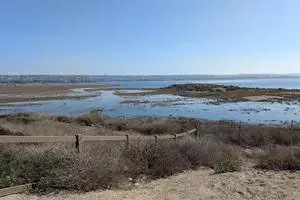
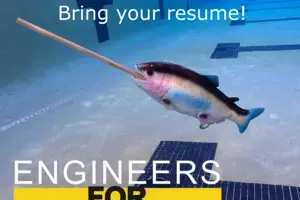



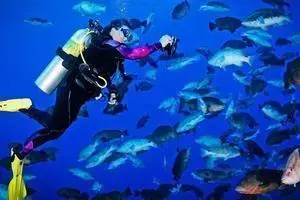

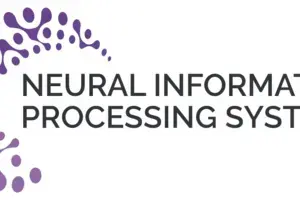
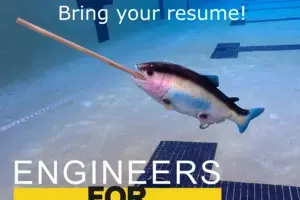
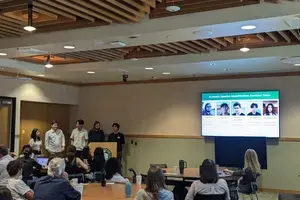
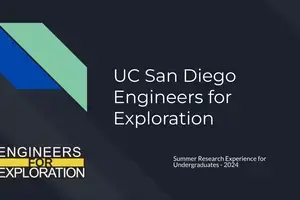
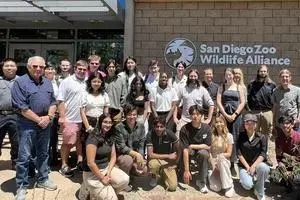
subscribe via RSS
